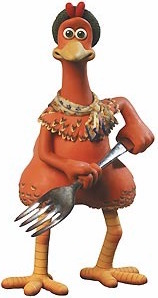Chicken Run for the Despondent Soul
 Thursday, November 10, 2016 at 9:01AM
Thursday, November 10, 2016 at 9:01AM by Daniel Crooke
 In the wake of Donald Trump’s victory on Tuesday, it’s been a challenge not to hide under the covers and never come out. When fundamental civil liberties, minority rights, and the safety of the entire planet are on the line, the diverting promises of everyday distractions are a mixed bag; the stakes are high, the situation is dire, and change depends on every single American who believes in justice for all to keep their eyes open and their voices loud on the task at hand. Action demands itself. Everything else can feel a bit frivolous right now.
In the wake of Donald Trump’s victory on Tuesday, it’s been a challenge not to hide under the covers and never come out. When fundamental civil liberties, minority rights, and the safety of the entire planet are on the line, the diverting promises of everyday distractions are a mixed bag; the stakes are high, the situation is dire, and change depends on every single American who believes in justice for all to keep their eyes open and their voices loud on the task at hand. Action demands itself. Everything else can feel a bit frivolous right now.
But for those who need a quick bit of movie fantasy with a hearty, hopeful dose of relevance, I would recommend clicking over to Netflix like I did last night to refamiliarize yourself with the crackling Aardman claymation caper Chicken Run - a story about a henhouse uprising of economically disadvantaged chickens taking their rights back from the human farmers who mean to exterminate them in the name of wealth concentration and boundless brand recognition.
Concerned fundamentally with the importance of political organization as a means of toppling inhumane powers that threaten freedom and liberty, Chicken Run is a model for the promises of civic engagement. The film's clucking characters escape the despair-cast shackles of its dead end world by tirelessly fighting the good fight against odds impossibly stacked against them. Their fearless leader Ginger carries the torch for the film’s fowl feminism, outsmarting the bloviating, dimwitted, and fraudulent men on the farm to shine a path through the darkness for her disenfranchised comrades. Indeed, it is only when the night falls into its pitchest black that Ginger and her team of nasty women band together with enough grit and goodwill to extinguish their enemy once and for all and seize their brighter tomorrow. Food for thought.



Reader Comments (5)
Thank you! I'd totally forgotten how engaged this movie is, and now I need to watch it RIGHT AWAY.
And thanks to TFE, Nathaniel and all the contributors - in times of collective shock, a community like this is invaluable.
I could marry this article if it wasn't for the sad context and reason for its existence.
I would not say Ginger outsmarts "the men of the farm" the villan is a woman and her not really bright husband. And Ginger has a helpfull love interest too.
Men on the farm doesn't refer to the big bad. Ginger spends very little time with Mrs. Tweedy - she more represents an overriding ideology I described above - so her ground game is focused less on her than dodging the dudes in her way. It refers to her idiotic husband who consistently throws Ginger in dumpsters and pie machines to demoralize her. Her love interest is a fraud who preached fantasy to her friends, and Ginger has to work twice as hard to motivate and organize them once she has unmasked him. And the veteran rooster claims authority over the chickens despite having no leadership experience whatsoever. Ginger has to exploit his chest-puffing machismo to make him fly the plane in the end. She spends more time navigating around the men and making up for their mistakes than she does the woman who owns the farm.
Daniel what a tonic it is to read your essay. This Aardman work of genius is always fun to watch and in these times it could be considered inspirational. As a fan of "The Great Escape" there are many touches that recall that POW classic.
Think I will watch that tonight. Thanks.